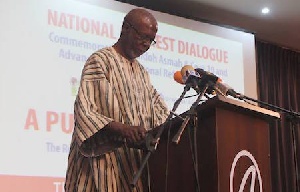A Professor of political science, Kwame Ninsin has observed that elections in Ghana have become a “theatre of war”.
“Rather than function as a means for resolving conflict peacefully, and building consensus about how and who to solve the urgent issues of development that face the country, elections have become a theatre of war between the major contending political parties,” the Scholar-in-Residence of the Institute for Democratic Governance (IDEG) said in a lecture on “The 1992 Constitution: The Urgency of Reform” organised by Gyandoh Asmah & Co and IDEG on: “The role of constitutional reforms in consolidation peace, stability and national cohesion” on Thursday December 18, 2014.
“The booty from this war is the omnipotent executive that controls society and its immense wealth,” the former head of the political science department of the University of Ghana said.
According to him, “by the 2008 and 2012 elections, electoral contest had become adversarial and bloody with the leading political parties determined to inflict severe political damage on their opponent, better described as political enemy.”
Prof Ninsin noted that apart from the polarisation created as a result of political contest, “elections continue to leave footprints of widening ethnic and regional divisions, bitter political rivalry, unnecessary suspicion and a disposition among the political class to fight till victory is theirs.
“Regrettably this culture of politics has no place for compromise and consensus. Indeed the drama that characterised the transfer of power and administration in 2001 and 2008 left dark shadows of the serious political divide that elections continue to leave in their trail. Also, the serious wrangling that followed the 2008 and 2012 elections bear eloquent testimony of the threat of post-election conflagration that looms.”
Politics of Monday, 22 December 2014
Source: starrfmonline.com
Ghana’s elections now “theatre of war”
Entertainment
















